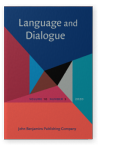Vol. 10:3 (2020) ► pp.422–442
Dialogic construction of authority in Hebrew women’s writing from the 19th century
The article discusses quotations as linguistic means for constructing authority. It seeks to attenuate two accepted premises regarding quotations and authority in linguistic research: firstly, that the source of quotation is the (single) source of authority, and secondly, the writer’s dichotomic attitude toward it: reliance or refutation. Two opinion essays in Hebrew were examined, authored by a woman and published in a Maskilic periodical during the 19th century – a time when women were denied the social license to write in Hebrew. The pragmatic micro-analysis shows that the writer uses various linguistic means to construct her authority by means of dialogical conflicts between several external sources: the Jewish canonical texts, her educated peers or prevailing viewpoints of the time.
Article outline
- 1.Introduction
- 2.Historical and social background
- 3.Literature review
- 3.1Linguistic means for construction of authority
- 3.2Bakhtin’s dialogism theory
- 4.Data and methodology
- 5.Analysis
- 5.1Examples where the salient source of authority is a Jewish canonical text
- 5.2Examples where the salient source of authority is a prevailing viewpoint of the time
- 6.Summary
- Acknowledgments
- Notes
-
References
